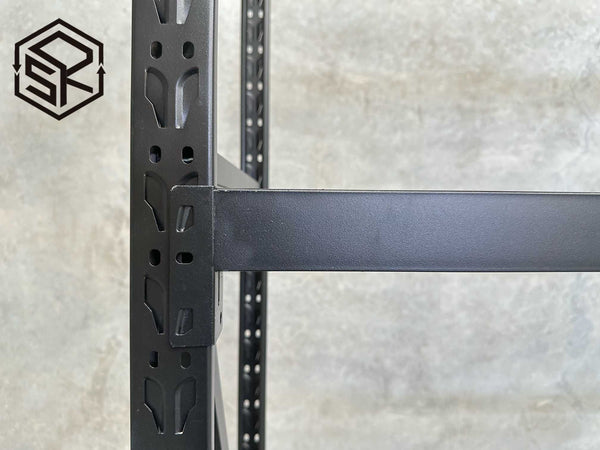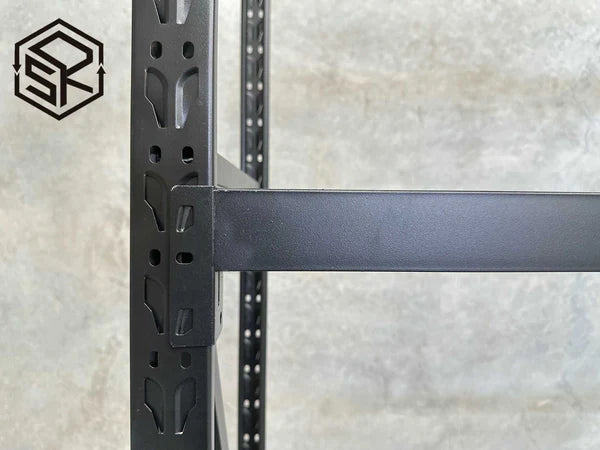Organizing your garage is a task that requires careful consideration, especially when it comes to selecting the right shelving system. One crucial factor to ponder is the thickness of the shelves, as it directly influences their strength, durability, and overall utility. In this comprehensive guide, we will delve into the considerations that go into determining the best thickness for garage shelves, ensuring you make an informed decision for an organized and functional garage space.

Shelf 1.8m(H)x1.2m(L)x0.5m(D)600kg
The Basics of Garage Shelving:
Garages are versatile spaces that often serve as storage areas for tools, equipment, seasonal items, and more. Efficient garage shelving is essential for maximizing this space, allowing you to keep items accessible, tidy, and well-organized. The thickness of the shelving material plays a pivotal role in determining its load-bearing capacity and overall durability.
Factors to Consider:
-
Load-Bearing Capacity: The primary purpose of garage shelves is to support the weight of various items, from heavy tools to storage boxes. The thickness of the shelving material directly affects its load-bearing capacity. Thicker shelves can withstand more weight without sagging or buckling, making them ideal for storing heavier items commonly found in garages.
-
Material Selection: The material used for garage shelves can vary, including wood, metal, and plastic. Each material has its own set of advantages and considerations. The thickness required may differ based on the material's inherent strength. For example, wooden shelves may need to be thicker than metal ones to achieve similar load-bearing capabilities.
-
Span and Support: The distance between the supports or brackets on which the shelves rest, known as the span, is a critical factor. Thicker shelves provide better support over longer spans, reducing the risk of sagging. Consider the layout of your garage and the distance between the support points when determining the optimal thickness for your shelves.
-
Intended Use: The purpose for which you plan to use your garage shelves is crucial in determining the required thickness. If you're storing lightweight items like seasonal decorations, a thinner shelf may suffice. However, for heavy tools, automotive parts, or other weighty objects, opting for thicker shelves is recommended to ensure durability and safety.
-
Budget Constraints: While thicker shelves offer enhanced strength, they may also come at a higher cost. Consider your budget constraints when choosing the thickness of your garage shelves. Striking a balance between cost and performance is essential to make a practical and economical choice.
Recommended Thickness for Different Materials:
-
Wooden Shelves:
- Light Duty: 3/4 inch to 1 inch
- Medium Duty: 1.25 inches to 1.5 inches
- Heavy Duty: 1.75 inches and above
-
Metal Shelves:
- Light Duty: 18 to 20 gauge (approx. 1.02mm to 0.91mm)
- Medium Duty: 16 to 18 gauge (approx. 1.29mm to 1.02mm)
- Heavy Duty: 14 gauge and below (1.63mm and below)
-
Plastic Shelves:
- Light Duty: 1/8 inch to 1/4 inch
- Medium Duty: 3/8 inch to 1/2 inch
- Heavy Duty: 5/8 inch and above

Choosing the Right Thickness for Your Garage Shelves:
-
Assess Your Storage Needs: Evaluate the types of items you plan to store on your garage shelves. Take into account the weight and dimensions of these items to determine the load-bearing capacity required.
-
Consider the Material: The material you choose for your garage shelves influences the required thickness. Wooden shelves typically need to be thicker than metal or plastic shelves to achieve similar strength.
-
Factor in Span and Supports: Determine the distance between the supports or brackets on which the shelves will rest. Thicker shelves provide better support over longer spans, reducing the risk of sagging.
-
Account for Budget Constraints: While thicker shelves offer enhanced strength, consider your budget constraints. Find a balance between cost and performance to make a practical and economical choice.
-
Future-Proof Your Shelves: Anticipate your future storage needs when selecting the thickness of your garage shelves. Opting for a slightly thicker option than currently required can ensure that your shelves remain sturdy as your storage needs evolve.
Selecting the best thickness for your garage shelves is a crucial step in creating an organized and functional storage space. By considering factors such as load-bearing capacity, material selection, intended use, and budget constraints, you can make an informed decision that aligns with your specific needs. Whether you opt for wooden, metal, or plastic shelves, finding the perfect balance in thickness ensures that your garage storage solution stands the test of time, supporting your tools and belongings with strength and reliability.

